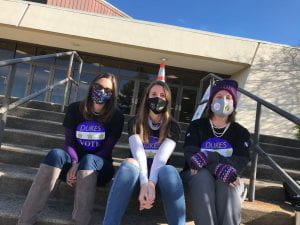 Co-taught by Prof. Cathy Copeland (Writing, Rhetoric & Technical Communication), Prof. Adrienne Hooker (School of Media Arts and Design), and Dr. Carah Ong Whaley (Political Science), the interdisciplinary JMU Civic and JMU Xlabs Hacking4Democracy: 2020 Elections combined scholarship and experiential learning to develop and implement nonpartisan voter education and engagement initiatives at James Madison University for the 2020 Elections. Scholarship addressed complex issues and challenges for the 2020 elections, including: how the pandemic affected elections, the presidential nominating process, state laws and Electoral College structure the game; and the impact and role of political parties, superPACs, interest groups and the media, with a special focus on the increasing role of social media. We also examined the role and impact of campaign strategy, tactics and operations, polling, campaign finance, presidential debates, and the importance of who turns out and why.
Co-taught by Prof. Cathy Copeland (Writing, Rhetoric & Technical Communication), Prof. Adrienne Hooker (School of Media Arts and Design), and Dr. Carah Ong Whaley (Political Science), the interdisciplinary JMU Civic and JMU Xlabs Hacking4Democracy: 2020 Elections combined scholarship and experiential learning to develop and implement nonpartisan voter education and engagement initiatives at James Madison University for the 2020 Elections. Scholarship addressed complex issues and challenges for the 2020 elections, including: how the pandemic affected elections, the presidential nominating process, state laws and Electoral College structure the game; and the impact and role of political parties, superPACs, interest groups and the media, with a special focus on the increasing role of social media. We also examined the role and impact of campaign strategy, tactics and operations, polling, campaign finance, presidential debates, and the importance of who turns out and why.
In this 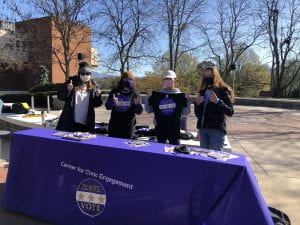 post, a selection of students in the JMU Civic and JMU Xlabs Hacking4Democracy: 2020 Elections course reflect on their personal experiences and takeaways from the course and how the course informed their view of the 2020 Elections. As part of the course, students interviewed and developed questions for candidates for JMU Civic and Dukes Votes 2020 Nonpartisan Voter Guide; developed issue primers and facilitated discussions for the presidential and vice presidential debates; volunteered leading up to or on Election Day, facilitated text messaging campaign to get-out-the-vote, and worked as an Election Officer; and attended Town Halls with political candidates.
post, a selection of students in the JMU Civic and JMU Xlabs Hacking4Democracy: 2020 Elections course reflect on their personal experiences and takeaways from the course and how the course informed their view of the 2020 Elections. As part of the course, students interviewed and developed questions for candidates for JMU Civic and Dukes Votes 2020 Nonpartisan Voter Guide; developed issue primers and facilitated discussions for the presidential and vice presidential debates; volunteered leading up to or on Election Day, facilitated text messaging campaign to get-out-the-vote, and worked as an Election Officer; and attended Town Halls with political candidates.
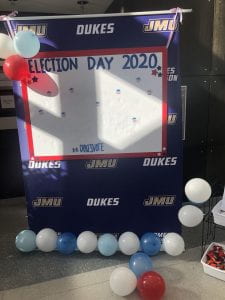
Election Day board at JMU’s Athletic Performance Center where Caitlin helped answer questions on Election Day.
Caitlin Nelson, JMU ’21, Writing
Truthfully, I had never invested a lot of time into the elections before this year. Of course, I would pay attention to the candidates and who they were, but I never got really into it. Part of that could have had to do with the fact that I wasn’t able to vote due to not being old enough. I also think that I came from a household of parents who weren’t big into elections. They did their civil duty and would vote, but they wouldn’t read all into it, or even watch the debates. When I first signed up for this class, I just figured I was meeting a requirement I need in order to graduate. I didn’t think that I would become as invested into it as I did. This class has taught me so many different things about the election, and I can genuinely say that I was excited every time we got on a zoom call to chat about it. I think that my biggest take away from this class was how much of an influence campaigning can have, and how much money the candidates put into the different ads that they put out. I don’t think that I had ever really understood how much goes into the election and this class certainly opened my eyes to all of the finer details of the election. The articles that we read throughout the year had some really cool graphics that showed the concerns of the elections, or the budget that the campaigns have, and many other interesting things that I didn’t ever really think about.
The process of interviewing and developing questions for the Voter Guide was really fun, until there was an issue with no one coming back with responses. I think that there was a lot that went into preparing the questions and then emailing it out to different candidates, so to get a lack of response had been a little frustrating. However, the process was really good for me to experience. A career option for me is to be a journalist, and I think that this sort of activity was good to know what good questions were to ask, and then what might not have been as strong of a question to ask.
Putting together the debate primers was so much fun. I loved being able to research a vast number of topics and know what I should include in order to help educate people. From the perspective of someone who doesn’t know everything to know about every topic, I felt like I was also able to get educated during the process of researching the different topics. Unfortunately, due to my surgery I wasn’t able to get out and volunteer as much as I would have liked, however, I was able to text a bunch of people about the election which sparked a lot of conversations. The activities we have completed this semester have helped shape my view on the 2020 elections because of the huge stigma that has been around both of the candidates. I was able to properly educate myself so I could feel confident with who I was voting for. One thing that this class gave me that not many other classes have over my academic career were some real-life lessons. In the next elections I will know the proper ways to educate myself in order to remain confident while I am voting, and also, I can help educate other people. Rather than just doing assignments for this class, I was really able to get stuff out of the lessons and I have loved every second of the class for sure!
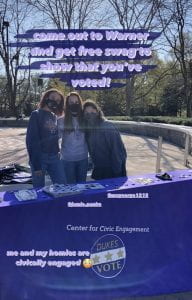 Jamie Panko, JMU ‘23, Political Science
Jamie Panko, JMU ‘23, Political Science
I feel extremely lucky to have taken this course during this semester because it felt less like a class and more of an analysis of how we are viewing the current events as they happen. I think what I learned most was how to analyze how someone’s background might influence how they vote and/or think. Before this class, I thought that voting habits fell mostly along geography, but I learned how the influence of the media plays a big part in shaping someone’s political views. Analyzing social media habits, including my own, made me realize how far-reaching media influence is. This, additionally, taught me empathy for other people, despite the fact that I might disagree with some of their views. Similarly, I thought Discord was a great way to create an environment where students could disagree but still learn from one another. Being a moderator helped me point out biases and stop them. Even if one disagrees with another side, it’s important that you understand other viewpoints and compare them to one’s own.
A couple of experiences I really enjoyed was working on Election Day both in the morning and night because I got to interact with politically-motivated students and hear about their thoughts throughout Election Day. Also, I enjoyed writing the brief on when states might learn their election/litigation results because it gave me additional background going into Election Day on what to expect. I was able to share my article with friends and family who had questions about state-specific election issues. I appreciated that we got to interview a variety of candidates for the Voter Guide since there isn’t nearly as much talk about state and local elections as national elections. Also, it was great to hear back from Jo Jorgensen because I wouldn’t have expected a presidential candidate to personally respond to college students. Overall, this class felt very important to me since many of the people around me don’t care as much about politics, but on Zoom and Discord I could learn from other political students. There have been few times in college where I consistently looked forward to every class, but I always felt motivated to not miss class since we learned so much every week.
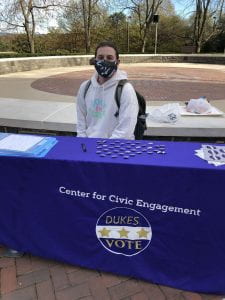 Thomas Weber, JMU ‘21, History
Thomas Weber, JMU ‘21, History
I had several takeaways from this class, which was part of why I decided to declare a POSC major, be more informed, and potentially work in this field. Attending college during the Trump presidency has been interesting. Prior to this class, I attended a few talks sponsored by the History Department known as “Democracy in Peril” as a sophomore. It didn’t truly register to me then the depth at which our country was changing, and the precedents Trump was setting. While I have always been outspokenly progressive, I had always comforted myself with a sort of “the good guys always win” perspective. When taking this class this year, I gained a lot more knowledge on the electoral process and the true level of money in politics, and how candidates come to be elected. Further, having this information while experiencing the 2020 election only inspired me to be more involved. More people voted and voted by mail in this election than any election in U.S. history. However, it was still only a third of the U.S. population. Knowing what I know now about the election process, and witnessing the election and Trump’s subsequent attempts to steal it have made me want to work harder to protect the democracy we live in. Further, I want to inspire more people to vote and be informed on the issues that concern them, rather than have them not participate and risk another election like this one.
My experiences writing voter guides, participating in debates, and my time as a volunteer have changed my perspectives on democracy and the 2020 Election. As I mentioned, I used to carry a nonchalant attitude about politics, believing strongly that I was right but simply having faith that things would work out. To me, this class and my experiences have shown me that politics is an incredibly active “fight.” In the debates among students, I witnessed encouraging discussion and recognition of failings of candidates – but also in some cases, a complete rejection of fact and truth (e.g., “the Proud Boys are not a white supremacist group” despite their leader recently admitting they are). Many Americans take this nonchalant view of politics and refuse to engage. Others that do engage on both sides of the aisles often isolate themselves in echo chambers rather than take action. In order to protect our democracy, individuals that care need to fight tooth and nail to inspire others to participate, educate others about the issues that concern them and give them the tools to do so themselves. As this election shows, it is the only way that we can continue to protect democracy in the United States.
Haley McAlister, JMU ‘21, History
I learned a lot about the finances behind elections. I had never heard of dark money before I took this class, and it scares me that I don’t always know who is behind advertisements that might influence me. I am shocked that fourteen billion dollars went into this election. It upsets me knowing that money could go anywhere else. Learning about dark money and the influences behind political advertising made me think about the advertisements I saw knowing that someone somewhere, that I will never know, wants me to make a decision that will benefit them instead of me.
At first I struggled thinking of questions for candidates because I thought my questions were too simple and they would want to discuss something more complex. I had to go back to my values, and I realized that simple questions about life in our community become complex very quickly. Plus, I found out that other people probably had the same questions as I did and were hesitant to ask. I liked attending the virtual Town Halls because I got to hear from the candidates directly rather than their campaign, and it was neat to see different perspectives in the political process.
I enjoyed facilitating discussion during the debate, but I found it difficult to do without the support of my group and trying to moderate partisan discussions. It was hard to read a room virtually and encourage people to move on to discuss other topics while still recognizing that their opinion and feelings were important.
My favorite parts of this class were learning about the Election but then going out and participating in hands-on work in the community. I stuffed absentee ballots twice and got to see the precision and care Mark Finks took in making sure people in Harrisonburg had safe access to voting. I worked as an Election officer which was very cool. It was a very long day, but I got to witness democracy happening. I’ll never forget walking down the line at 6am that Tuesday and seeing people of Harrisonburg of different genders, ethnicities, races, education levels, and speaking different languages that all got to have their voice heard.
Kevin Golden, JMU ‘21, Political Science
Working the Virginia elections was an eye-opening process, and it really instilled a lot of faith in me on our electoral system. If every election center was run the way ours was in Harrisonburg, I would not doubt the results of any election. The transparency, and nonpartisan nature was great to see, and many of the complaints that were raised by critics of this election were already taken care of by Virginia’s system. I’m really glad we were pushed to volunteer for that opportunity, and though it was a really long day, I think everyone should do it. The election really opened my eyes with how the system works, and what’s effective. There were people who visibly hadn’t made up their minds come Election Day, and voted based off of the sample ballots.There were people who made up their minds, and didn’t want to talk to you (possibly out of fear you’d persuade them?). And there were people who did not seem completely there in the head, but their vote counted just as much as the others. The topic of election fraud is so interesting, because I really could see how much effort you would have to put in, for very little pay out. It’s a very high-risk, low-reward action compared to just handing out sample ballots, or like Kaylene Seigle did, greeting everyone with a big smile and being just a genuinely nice person.
Katelyn Crume, JMU ‘22, Public Policy & Administration
My biggest takeaways from this class are that young people’s voices do matter and can make a difference and people need to be better educated on early mail in ballots and absentee ballots. Developing the Voter Guide made me better aware of candidates and made me consider what factors in a person that I want to represent me. The debate discussions were some of my favorite nights during the semester because it was interesting to be watching the same thing as everyone else, but people perceived it in different ways. I also was impressed by how well behaved everyone was in the discussions. Working as an Election Officer made me see that absentee and mail in ballots were not explained well enough to people, and they were not able to complete or turn them in properly. I also learned that not enough people know where they are registered to vote and where their correct polling location is located.
My biggest takeaways from class are that it pays off in the long run to involve yourself in our democratic process and that too much money is spent on elections. I felt that I was much more informed than I would have been had I not taken this class; this election cycle had so much misinformation and confusion that I would have been lost had it not been for our class meetings.
Will Grimm, JMU, ‘23, Political Science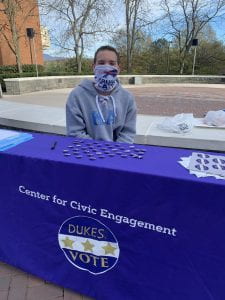
Taking this class allowed me to take a more hands-on approach to grasping the first election I was eligible to vote in. Where I noticed this class made a difference in the overall experience was not what election information I watched, read, or absorbed, but the avenues through which I did so. This is to say I would get the majority of my election information from TV. Unless it was a major news story that broke, TV was the way I would do so. However, with this class I really looked into the different facets of election season more. Sometimes it was the readings for discussion posts, Discord conversations, or even interviewing the school board candidates and seeing the way they campaign compared to the bigger stages. These are not things I would have done without this class. For example, when we would be in a Discord during a debate, I would simultaneously be watching with my roommates. A link regarding a statement by a candidate on a topic would be sent into Discord and I would read that while my roommates might just remark their opinions about what was just said. I engaged in the substance of the election more. This live fact checking in this Discord allowed for me to really fact check my own opinions. And through this, I think it helped me become more reactive as opposed to proactive when it comes to reacting to a political statement. As mentioned, I think this class was great practice at becoming more reactive than proactive to political statements. Being a political science major I’ve wanted to improve at this. Not to say that I am abrasive or rude, but I think I have a tendency to just speak and react to statements without fully digesting them. Being in Discord and in-class discussions were good practice in this category. It forced me to directly respond to what others were saying, but going along with the environment of the class, you wanted to have a well thought out response that could also be built off of. Developing this skill was one of the best things that I believe and am proud of that I will take away from this class.
Cole McRay, JMU ‘22, Economics & Public Policy and Administration
One of the most influential experiences I got from this course was participating on Discord during the presidential debates. I typically learn very little from these debates but for this class I was able to see the debates from another point of view. My classmates brought up many points I would have never thought about before by sharing their experiences or things they have read prior to these debates. Most of this information was new to me and gave me a much more informed view of the 2020 candidates.
Through my work on the Voter Guide I got my first ever experience communicating with an elected official. At first it was fairly intimidating to complete but after I feel much more informed and confident in how I can personally contact one of these individuals. It opened my perspective to these individuals that they truly do respond to a community member as I always saw them as unreachable. In my experience of working with the primers I felt much more informed going into discussion. I knew how each candidate would respond to certain questions and allowed me to formulate my opinions on certain topics. This was also an excellent group assignment as it helped me further educate myself on these topics through others thought processes. Lastly, I felt as though the volunteer work was a great way to be involved in the election process. This was personally not a first for me as I have volunteered at the polls before for certain high school clubs. One thing that was new was the text-canvassing assignment as I have never reached out to people in that way before this class. I got a wide array of perspectives on the election from people I have not talked to in years. I believe this was much more effective than I had originally thought.
Overall, I felt this class gave me a much more enriched understanding of the 2020 election and kept me heavily involved each step of the way. I came away with much different perspectives and can now talk to others in an educated manner about politics.
Elliott Mullen, JMU ‘22, Political Science & Criminal Justice
One thing this class taught me was how much spending and campaigning goes into elections, and the importance of understanding the effects this has on areas that are heavily focused during campaigning. We would discuss ad spending of each presidential candidate and what platforms they focused on for their outreach, and that was very interesting to learn. I learned from this class that Biden spent more on TV ads than Trump, who spent his campaign money on digital ads instead. Through the Pew Research studies that we read for class on multiple occasions, I learned what topics Americans valued the most while voting during this election cycle, which was COVID and the economy. I also learned the importance of being involved in one’s local and state elections, as those more important in a person’s day to day life than the presidential election.
Through interviewing the candidates for city council and other political office positions, I realized the importance I place in candidates being confident in their answers and communication they give to their constituents, and the policies they wish to pursue,and not just running on good character or only diversity. I used the Voter Guide the day before I went to vote to figure out the policies of some of the local candidates for office, and appreciate that being a resource, as a lot of the individuals working the polls and those distributing flyers for candidates were biased in their advertising of their candidates. This made me realize the lack of education people have in looking past bias in the information they receive. People who don’t have access or choose not to access the resources available to them to learn about candidates can result in them being fed “white-lies” and biased information that can make them vote for someone who has conflicting policies from their own.
The town halls were interesting to see as they educated me on certain candidates’ beliefs and views on topics, with the most interesting ones in my opinion being the presidential town halls that were created as a result of the second presidential debate being cancelled. I have always loved democracy and the positives it brings to our country and others, but am concerned that our current system of democracy is at risk of being degraded and damaged, as 2020 has been a very difficult and volatile year. Political polarization has only increased since Trump’s election in 2016, and with the uncertainty and confusion regarding the current presidential election, this issue will only worsen and hurt relationships and create more stress and anxiety for individuals.
Matt Rutherford, JMU ‘22, Political Science & Public Policy and Administration
This class educated me a lot more on presidential elections, how they work, and what the people in each party prioritize the most when potentially voting for a candidate. I was able to identify what each candidate’s voters were more focused on. My professors were able to educate me on not only the simple fact of a presidential nominee reaching 270 to win an election, but how the process works in order to achieve the goal. Being able to facilitate primers, and talking to some city and state candidates helped me realize that the state and local elections are just as important as the presidential. However, the state and local elections don’t gather enough revenue to advertise elections as much as the presidential one – since they happen very often compared to the presidential.
Maeve Davis, JMU ‘22, Policy & Admin & Economics
The class provided me with a more bipartisan look at things. It’s easy to get stuck on one end of the political spectrum, and while I still lean left, I believe I have a greater appreciation for the nuances of democracy and the flaws and strengths on both sides of the aisle.
My experience allowed me to have a different perspective when it comes to elections and elected officials. In talking to the City Council candidates, I was able to actually get to know the person that they are and their beliefs. It was a nice change of pace, a stark contrast compared to presidential and congressional candidates. It was also entertaining to see the candidates still campaigning (even when we were just a small group asking questions). The most enjoyable part was the Discord discussion during the debates; it helped to know that other people were thinking the same thing as I was.
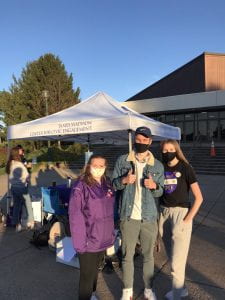 Emily Baker, JMU ‘21, Political Science & English
Emily Baker, JMU ‘21, Political Science & English
I am so proud to be a part of the work that JMU Civic is doing each and every day and I think I have grown personally and professionally through my involvement. I actually really enjoyed the challenges posed by each of the assignments, especially writing primers. I think working in nonpartisan civic engagement is a real challenge, you are constantly under fire from those accusing you of working to advance a specific ideology, when you are in fact just trying to get people to vote. Especially in 2020, I think our work is about defending democracy and the fundamental principles behind it and I think there’s something super noble in fighting the good fight.
Madelyn Ward, JMU ‘23, Public Policy & Administration/Economics/Pre-Law/Political Science
My biggest takeaway from this class is there is never enough information you can know about the election process unless you decide to take the information you know and put it into action. It is also essential to educate yourself about both sides of an argument before facilitating conversation to ensure that both sides are heard. We can slowly as a society shift towards understanding one another. By creating the Voter Guide, facilitating debate primers and discussions, and sending out texts to inform our peers about the election, aside from more relevant information about Harrisonburg’s local candidates, I also learned that many people were either very invested in politics or frankly didn’t care. This may be due to the current political climate, or maybe some of us haven’t had any life experience that has caused us to care deeply about how our elected officials can potentially impact our lives. Whatever it is, I enjoyed the information that was given to us. This class provided a unique perspective on the election process and was a great learning experience overall.

Recent Comments